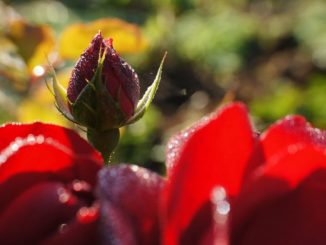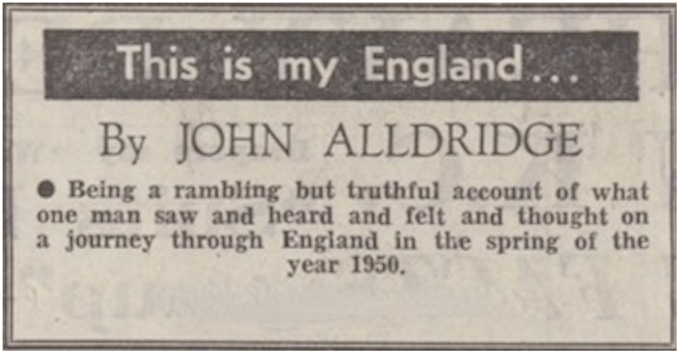
This Is My England,
© 2022 Newspapers.com
If there was one place in England I did not intend to visit it was Clovelly. I knew just what to expect: I have seen that quaint little High Street, climbing like Jacob’s ladder from earth to heaven, on a hundred calendars and chocolate boxes.
And that was one aspect of England I wanted to avoid: the “quaint.” And Clovelly, from all accounts, was the quintessence of quaintness.
So we were fully decided to avoid that tempting signpost. We would stay the night at Bude, we said, and then drive north.
But one look at Bude — which Baedeker describes, ominously, as a “rising watering place” — was quite enough. There was no point in wasting time, even to eat and sleep, in this brash young town full of bright red brick.
And by the time we had got back onto the road again it was already getting dark. We said we’d stay at the next place we came to, whatever it was. The next place we came to was Clovelly…
Thinking back, I’m glad we didn’t miss Clovelly. Because if we had we should never have met Arthur and learned an interesting thing or two about donkeys.
But I didn’t think so at first. Because before we knew what was happening we were running into a large car park, which lurks like a spider’s web at the end of the road. And, late though it was, there was a man waiting to collect our shilling.
“Aha!” I thought. “This is where the ‘quaint’ racket begins. Clovelly is at Ye Olde Game.”
It was some time before I realised how much easier and much more profitable it would have been to have built a motor road into the village.
No doubt it would have meant hacking down some of the rich, tangled undergrowth that now hides the village from view. But it would have provided a magnificent “scenic drive” and trebled the number of Devonshire cream teas.
I may be wrong, of course. But it seems to me that years ago, when Clovelly folk found themselves alarmingly on the map for the first time — thanks very largely to the Rev. Charles Kingsley, who had spent most of his boyhood there and, accordingly, salted his best-seller “Westward Ho!” with rich references to it — they decided, right at the beginning, that they would live not altogether on the tourists but in spite of them.
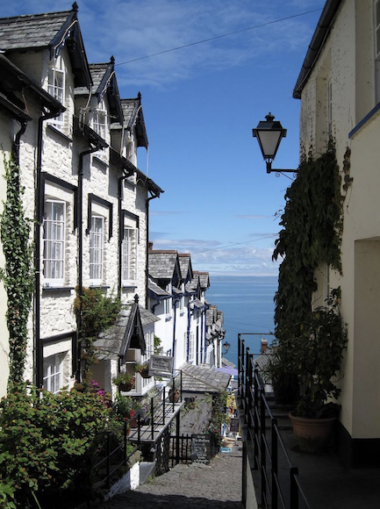
Clovelly, Devon,
Olaf Tausch – Licence CC BY-SA 3.0
If you think this is queer psychology just imagine, for a moment, that you live in Clovelly. Almost certainly one or more of your windows will face onto High Street — which is a very high street indeed.
Now imagine that every day, between 10 in the morning and six at night, for five months in the year an eager stream of sightseers goes clattering past your windows.
Worse than that, every time you look up from your ironing or darning you catch a round, red face staring at you through the window, as though you were some unique species of goldfish.
And every time you open your front door half a dozen cameras click rapturously and you know that it’s only a matter of time before half a dozen photo albums stretching from Sheffield to Sioux City are labelling you as that quaint old character we met in Clovelly.
It would not be so bad, perhaps, if this daily invasion treated the place with decent respect. But few of these brief visitors, who coo with delight as they go “downalong” for the first time, and groan with exhaustion as they come “upalong” for the last time, seem to have read Mr. A. A. Milne’s gentle warning:
“For empty tins and tangled strings
And paper bags are not the things
To scatter where a linnet sings”
Nor are ice-cream cartons and toffee papers the most appropriate souvenirs to leave behind on a length of steep, cobbled street. Particularly when the entire Cleansing Department probably consists of an elderly man and a donkey.
I should not be surprised to hear that the real Clovelly folk let out the sordid trafficking in souvenir brass and postcards to people from another village and keep well away from the place until after the last motor-coach has gone hurtling back to Newquay and the last film has been exposed for the day.
Then no doubt they come out on their doorsteps for an airing and lean blue-jerseyed elbows on the harbour wall and cock an eye at the weather, all as picturesque as you please.
That they do so I know. Because I’ve seen them. And believe it or not, on that convenient little landing they call the Look-Out I actually heard a youngster who might have posed for the original “Boyhood of Raleigh” asking a huge old fisherman — straight off a brewer’s advertisement — how many sails there were in a full-rigged ship.
Of course, they might have been staging it all for our benefit. But it seemed a lot of effort to waste on an audience of two.
We spent that night at the New Inn, which is picturesque enough considering it was rebuilt in 1918. I have only one complaint to make about the place, and that is that recently they have changed the signboard.
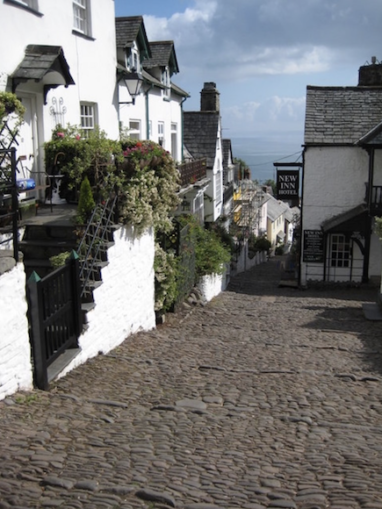
New Inn Hotel, Clovelly,
Philip Halling – Licence CC BY-SA 2.0
The old signboard used to tell you, without any nonsense — as all good signboards should — that this was the New Inn. No more and no less. Which was satisfying enough.
But now, from that board, I wouldn’t like to guess what the place was called.
I’ve noticed this tendency to mess about with good, honest signboards everywhere we’ve been. There was, for instance, a “St. George” who looked for all the world like something by Aubrey Beardsley.
St. George was one of your stout-hearted beer-and-pudding saints, and he would have ridden a horse that looked like a horse and not a miserable creature that couldn’t have pulled a milk cart, let alone charge a fire-eating dragon.
I don’t know who’s to blame — the landlords, the brewers, or the young ladies in Chelsea who paint these things.
But whoever it is I wish they wouldn’t.
We could not drive away from Clovelly, because we had left our car in the garage at the top of the hill. So we sent word to Arthur, who said he would call with Daisy and Kiwi when he had delivered the post and collected the dustbins.
Daisy and Kiwi are donkeys. Kiwi is five and Daisy is 12. Which is no age at all for a healthy donkey who may well live to be 40. Which is one reason why you rarely see a dead donkey.
There are five working donkeys in Clovelly now. There used to be 20 before the war. But feeding them became a problem in wartime, so most of them were pensioned off to good homes, where they can spend the rest of their days giving donkey rides to favoured children and munching windfalls in the paddock.
The best donkeys still come from Ireland. And females are easier to work than the male. Males are temperamental and would jib at the loads their ladies carry, everything from mail to fish crates, up and down a hill that’s about one-in-three, a dozen times a day.
We learnt all this from Arthur, who started donkey driving when he was 15 and has returned to it now that he’s turned 50. In between he’s travelled halfway around the world and introduced that soft North Devon burr into outlandish places like Constantinople and Cairo.
For that’s another thing about Clovelly men — they like to travel. (And if I had to face that daily invasion I should, too.)
If you know your “Westward Ho!” you will remember that two men from Clovelly were in that famous attack on the gold convoy.
No doubt — if they survived — they returned to the village, to wrinkle their eyes and tell strange tales upon the Look-Out; just as Arthur came back at long last from his travels and is quite happy among his donkeys.
So we did what all good tourists do when they leave Clovelly — let Arthur tie our luggage on Kiwi’s ancient wooden pack-saddle and led him up the hill, for all the world as if it was the depot camp we were leaving behind and all Everest ahead.
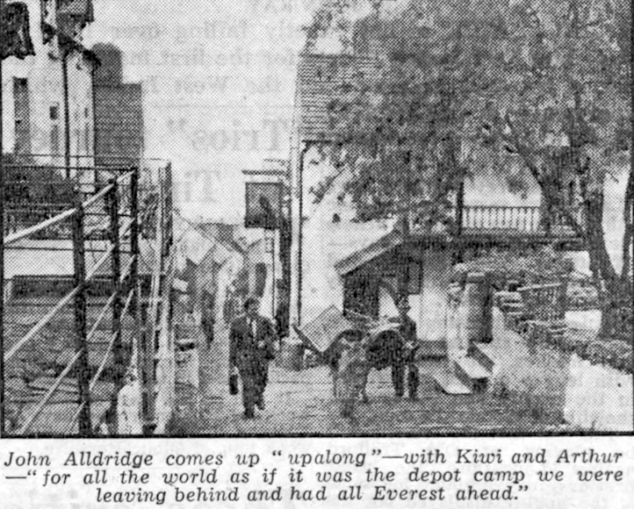
John Alldridge comes “upalong” – with Kiwi and Arthur,
© 2022 Newspapers.com
And that is really the end of the story. Because the rest of the day was spent reading maps and checking petrol gauges and making long-distance telephone calls.
England became a matter of signposts and by-passes. One minute we were among thatched roofs and whitewashed walls. And the next, it seemed, we were watching the extraordinary play of sunlight on mellow Cotswold stone.
I remember we stopped for half an hour at Wells, where we joined a crowd by the moat in the Bishop’s Palace who were hoping to photograph the swans ringing a bell to be fed.
But the swans had more natural dignity than we. They had been fed once already that day. And once was enough for any self-respecting swan. They were not gawping in front of a camera for anybody.
But you can’t treat England like this — dismiss a third of her (some say the best third) in half a dozen lines. So perhaps one day we’ll go back and pick up the thread and visit Bristol and Bath and Ross-on-Wye and Stow-on-the-Wold and all the other places we meant to see, but never did.
We missed them this time. But missed nothing essential. For one thing we learned: that England is like the coster’s barrow of apples: you can pick where you like, lady — they’re all lovely.
THE END
Reproduced with permission
© 2022 Newspapers.com
Jerry F 2023



